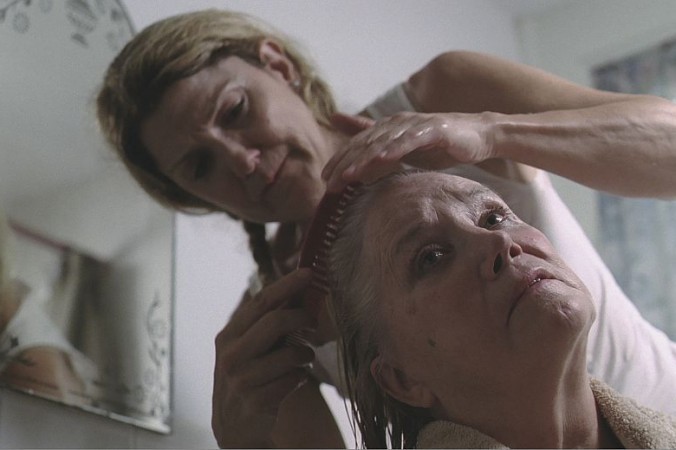Let’s be completely honest. Professional women are still expected to be faultless and competitive, make it look effortless, and downplay the demands of family and life outside of work. But every creative person and artist is searching behind her eyes, scanning as if in REM sleep, for the quiet time to create and feel like we really accomplished something for the day.
It was while I had begun to write my next script, for which I found funding, assembled a cast and crew, and directed as my vision demanded, that my gregarious, 79-year old widowed mother retired, and I started running the Mom-a-thon.
Phone calls came from strangers. “I have your mother here. She seems confused.” Jaded police called: “We followed your mom home. She got flustered around that detour.” Her doctor got her driver’s license revoked. I patched in services for her. She threw everybody out. Elder day care (can somebody please give it a better name?) worked. For a while.
At the elder center, my mother ate like a truck driver, sidled up to the retired men at her table, and told salacious stories. I got phone calls. “Your mother took her bra off today. We think her mentation is changing.” These calls always came in the middle of my writing, when I did not want to be verbal. “No, you don’t understand. She’s always been that way. It’s not the dementia.” The elder-care lady was not happy with me: “Her behavior is disruptive to the group and we can’t have this.”
I tried to explain. “She was a young widow. She worked in a helicopter factory with men. She always joked about doing a striptease, singing, ‘Take it off, take it off!’” So now I’m seen as difficult, too. I would ask my mother to be a little more aware, and I’d get, “Sharon, I don’t belong there. Those people are no fun. They’re dead heat!”
It was heartbreaking, because she was right.
Struck by how verbal and convincing my mother could be, I could not always trust the details. I wondered how I could portray a spirited, sexy, bulldozer of a mother who was in no way giving up the independence she had fought so hard to create. As with all my films, I had to break the stereotype of the frail, failing elder with dementia and offer up the full person I knew.
And through my own disability as a filmmaker who uses a motorized wheelchair, I understood that self-sufficiency hangs by a thin thread.
With Archaeology of a Woman, the third film I wrote and directed, I created the sensation of a mind at work with dementia, the struggle to assemble the pieces, the desperate drive for self-preservation. I employed character and performance to question perceptions and to acknowledge that reality in dementia exists on a number of simultaneous levels, a combination of places, of elasticized time, fear and anxiety.
The structure of my films are often linked to physicality, positioning the viewer within the work to experience the sensation of thinking with dementia. In this way I uphold the dignity of a character, faults and all.
A few grants came in, and I started casting and scheduling the shoot. The two lead roles — of a 70-year-old female lead and an over 40-year-old daughter — drew a lot of interest. IMDb rates skyrocketed and Facebook requests came in droves, including one I didn’t really believe, from Sally Kirkland. I learned later that her manager at the time read my script and hand-delivered it to her. Sally read it and Facebooked me. She and I later spoke for three hours about the character of Margaret, the story, and the parallels to our own lives.
There was no doubt, Sally was my Margaret.
Sharon Greytak has been defying stereotypes over the course of her esteemed career as one of the only disabled filmmakers directing, writing, and producing from a motorized wheelchair. The Boston Globe has cited Greytak as “having a unique vision of humanity,” and The Independent has named Greytak one of “10 Filmmakers to Watch in 2014.” Greytak has written, produced, and directed feature-length fiction films, documentaries, and experimental shorts. Her films include the award-winning international documentary Losing It, exploring quality-of-life issues and physical disability on three continents. For Losing It, she was the recipient of a Soros/Sundance Documentary Fund grant. Her critically acclaimed narrative-feature films include The Love Lesson, the story of an unconventional adoption arrangement between two women and their HIV-positive heterosexual son, and the award-winning Hearing Voices, exploring a model’s private and public identities. Earlier films include the seminal documentary Weirded Out and Blown Away and experimental films Some Pleasure on the Level of the Source and Czechoslovakian Woman.
Archaeology of a Woman opens Friday, September 12, at Village East Cinema in New York. For tickets, click here.







